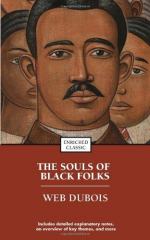
|
| Name: _________________________ | Period: ___________________ |
This test consists of 15 multiple choice questions and 5 short answer questions.
Multiple Choice Questions
1. What traits does DuBois say are associated with the plantation Negro?
(a) Sulky laziness.
(b) Joyful abandon.
(c) Shiftlessness.
(d) Scheming wiliness.
2. What was DuBois’ solution to feeling isolated by his race?
(a) To make new friends.
(b) To isolate himself socially.
(c) To suck up to people.
(d) To beat his classmates.
3. When did ‘the fire of African freedom’ cease to burn in American’ slaves’ veins, according to DuBois?
(a) 1750.
(b) 1870.
(c) 1808.
(d) 1860.
4. What most of the hundred hills of Atlanta crowned with, according to DuBois?
(a) Schools.
(b) Parks.
(c) Mansions.
(d) Factories.
5. What does the person who wants to be free have to do, according to the poem that opens chapter 3?
(a) Receive a blow.
(b) Withdraw his fist.
(c) Strike a blow.
(d) Stop the fight.
6. What has the poet not kept, in the poem that starts Chapter 7?
(a) His own vineyard.
(b) His own honey.
(c) His money.
(d) His family.
7. How does DuBois characterize progress.
(a) Necessarily ugly.
(b) Potentially devastating.
(c) Often beautiful.
(d) Surprisingly quiet.
8. What conclusion does DuBois come to, regarding color-prejudice?
(a) It is a relic of a previous time.
(b) It is part of human nature.
(c) It is the product of conditions.
(d) It is a decision men make.
9. In what realm does DuBois want to work alongside whites?
(a) The free market.
(b) The kingdom of culture.
(c) The public sphere.
(d) The international stage.
10. Booker T. Washington’s ascendancy is the most remarkable event in American race relations since when, according to DuBois?
(a) 1808.
(b) 1865.
(c) 1860.
(d) 1876.
11. Who does DuBois say does not wince when he sits with him?
(a) His student's father.
(b) His boss.
(c) Shakespeare.
(d) His student.
12. What is it that makes the shame in the poem that opens Chapter 6?
(a) The mind living in imagination.
(b) The body restraining the soul.
(c) The heart bursting from vexation.
(d) Death cutting life short.
13. What does DuBois say you must pass through on the way to the Temple of Knowledge?
(a) The Valley of the Shadow of Death.
(b) The Door of Self-knowledge.
(c) The Gates of Toil.
(d) The Sea of Doubt.
14. What ideal did Booker T. Washington believe in, that allowed him to lead?
(a) Political representation.
(b) Material prosperity.
(c) Religious transcendence.
(d) Intellectual equality.
15. What lightened DuBois’ teacher training?
(a) Marriage.
(b) Concerts.
(c) Picnics.
(d) Religious services.
Short Answer Questions
1. To whom does the burden of the Negro Problem belong, in DuBois' account?
2. Who did DuBois enjoy staying with the best?
3. How does DuBois characterize the war’s effect on Atlanta?
4. How does DuBois characterize life as a black man in America?
5. What is the afterthought to this third thought, in DuBois' account?
|
This section contains 465 words (approx. 2 pages at 300 words per page) |

|




